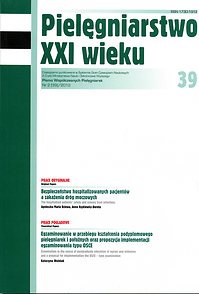Influence of education cycle on the awareness of nursing students about sexually transmitted diseases
Keywords:
sexually transmitted diseases, the cycle of education, awarenessAbstract
INFLUENCE OF EDUCATION CYCLE ON THE AWARENESS OF NURSING STUDENTS ABOUT SEXUALLY TRANSMITTED DISEASES
Aim. The aim of this study was to assess the impact of education on the awareness of nursing students about sexually transmitted infections.
Materials and methods. The study included 69 first-year students and 33 fourth-year students. The study was conducted by an anonymous questionnaire. The average age of all students was 22.6±5.4 years. The average age of initiation of first-year students averaged 17.8±1.2 years, while for four years-an average of 19.7±2.2 years.
Results. First-year students in the questionnaire obtained an average of 21 points, while the fourth year-20 points. As a way of protection against sexually transmitted diseases both groups of students mention condoms and having a regular partner. Over 28% of first-year students who began sexual intercourse reported that do not protect against sexually transmitted diseases, despite the fact that 20.4% of them use condoms as a method of contraception, which may indicate their lack of knowledge. Different between number of points obtained in the questionnaire by students of I and IV year is no statistically significant (p=0.8). Students who began intercourse obtained significantly more points than those who have not started sexual intercourse (p=0,01).
Conclusions. Starting sexual intercourse more than education cycle influence on the awareness of students about sexually transmitted infections.
References
1. Snowden L. An investigation into whether nursing student alter their attitudes and knowledge levels regarding HIV infection and AIDS following a 3-year programme leading to registration as a qualified nurse. Journal of advanced nursing. 1997; 25 (6): 1167-74.
2. Li Y, Scott C, Li I. Chinese nursing students' HIV/AIDS knowledge, attitudes and practice intentions. Applied Nursing Research. 2008; 21 (3): 147-52.
3. Suominen T, Koponen N, Staniuliene V. et al. Nursing students' attitudes towards HIV/AIDS patients In Finland, Estonia and Lithuania. Scandinavian Journal of Caring Sciences. 2009; 23 (2): 282-289.
4. Earl C, Penney P. Rural nursing students' knowledge, attitudes, and beliefs about HIV/AIDS: a research brief. Journal of the Association of Nurses in AIDS Care. 2003;14 (4): 70-3.
5. Pickles D, King L. Belan I. Undergraduate nursing student's attitudes towards caring for people with HIV/AIDS. Nurse Education Today. 2012; 32 (1): 15-20. Epub 2011.
6. Shouman AE, Fotouh AA. The impact of health education on the knowledge and attitude of Egyptian nurses towards occupational HIV infection. The Journal of the Egyptian Public Health Association. 1995; 70 (1-2): 25-35.
7. Mockiene V, Suominen T, Valimaki M. et al. The Impact of an Education Intervention to Change Nurses’ HIV-Related Knowledge and Attitudes in Lithuania: A Randomized Controlled Trial. The Journal of the Association of Nurses in AIDS Care. 2011; 22 (2): 140-9.
8. Uwakwe CB. Systematized HIV/AIDS education for student nurses at the University of Ibadan, Nigeria: impact on knowledge, attitudes and compliance with universal precautions. Journal of advanced nursing. 2000;3 2 (2): 416-24.
Downloads
Published
Issue
Section
License
Copyright (c) 2012 Seweryn Haratyk, Anita Kocięba-Łasiak (Autor)

This work is licensed under a Creative Commons Attribution 4.0 International License.




